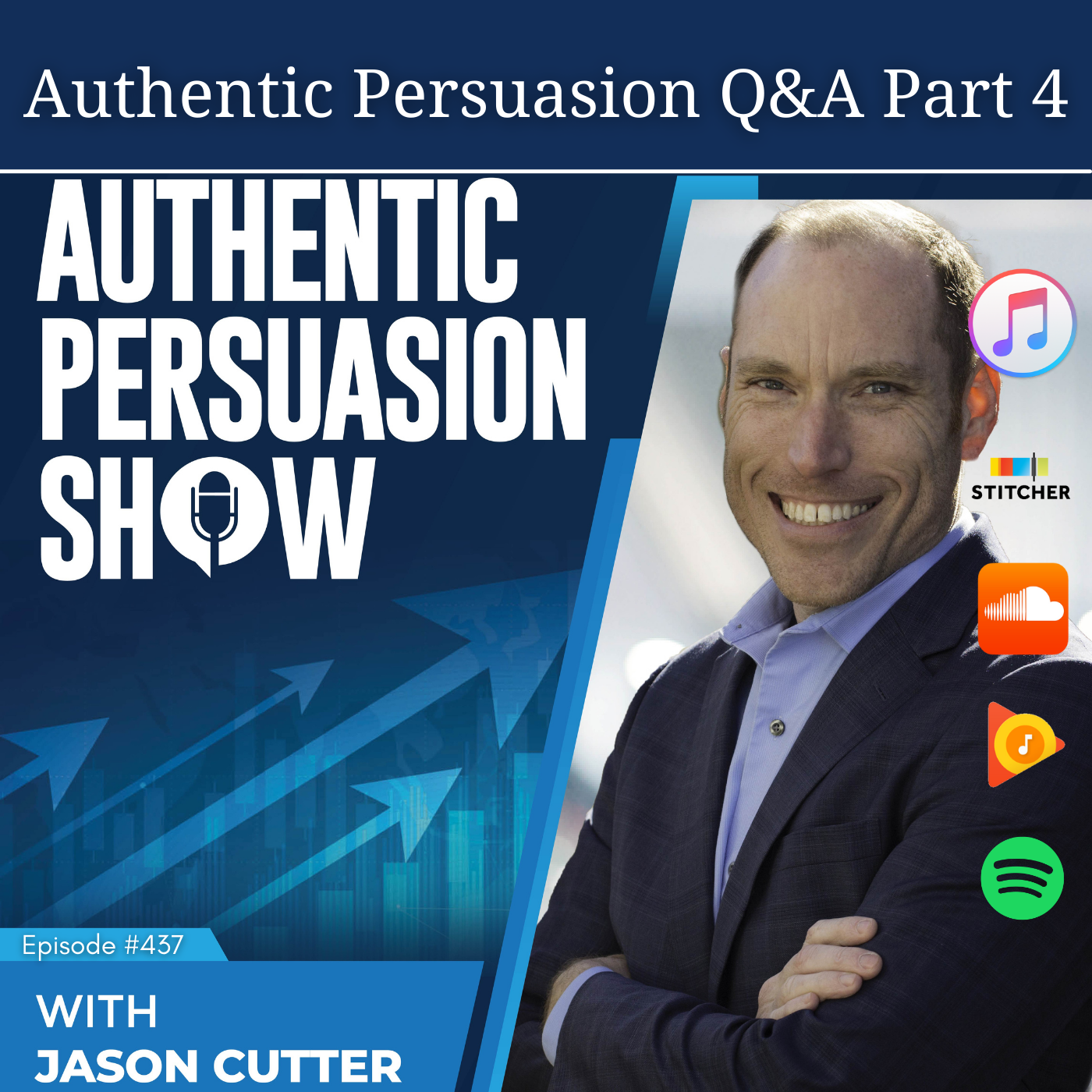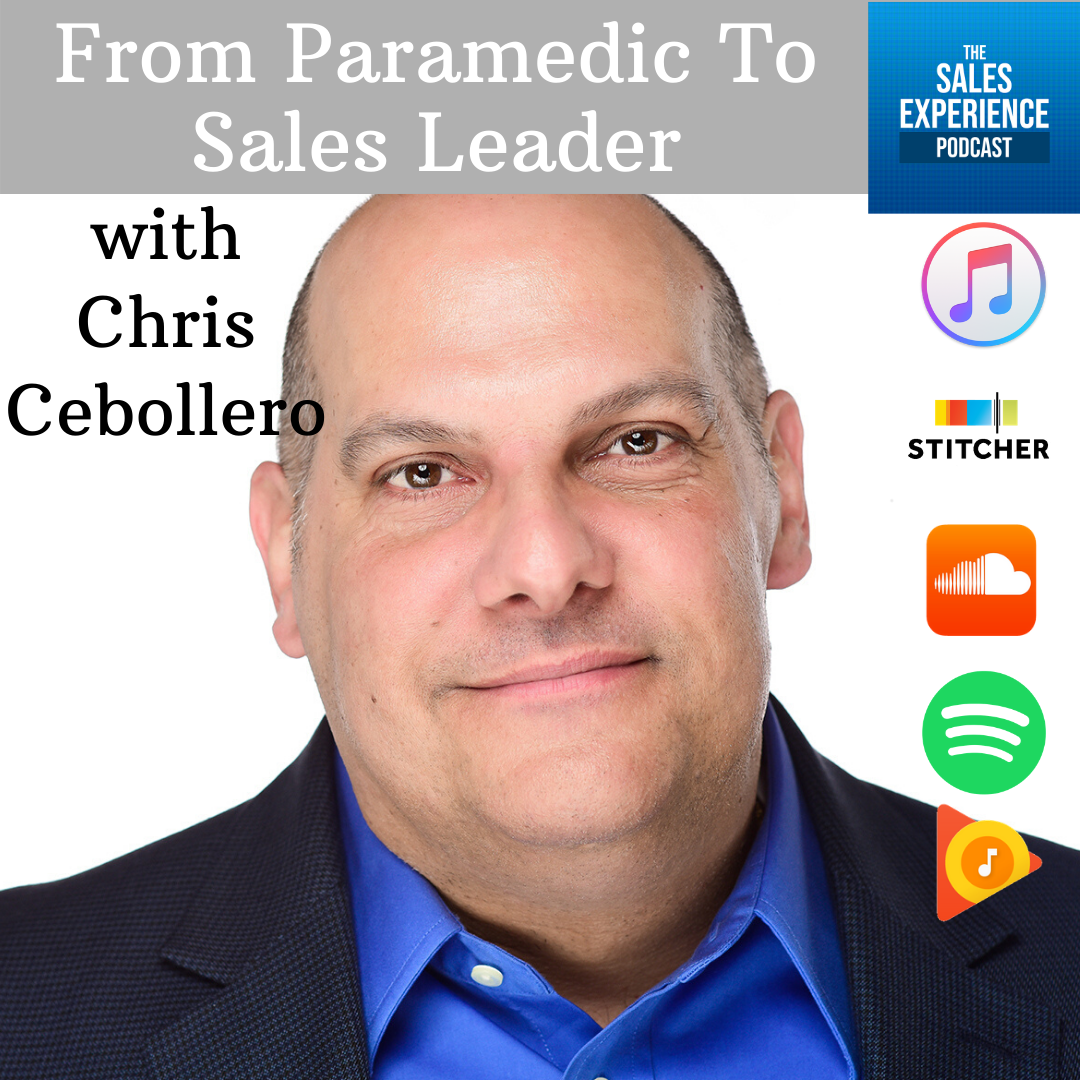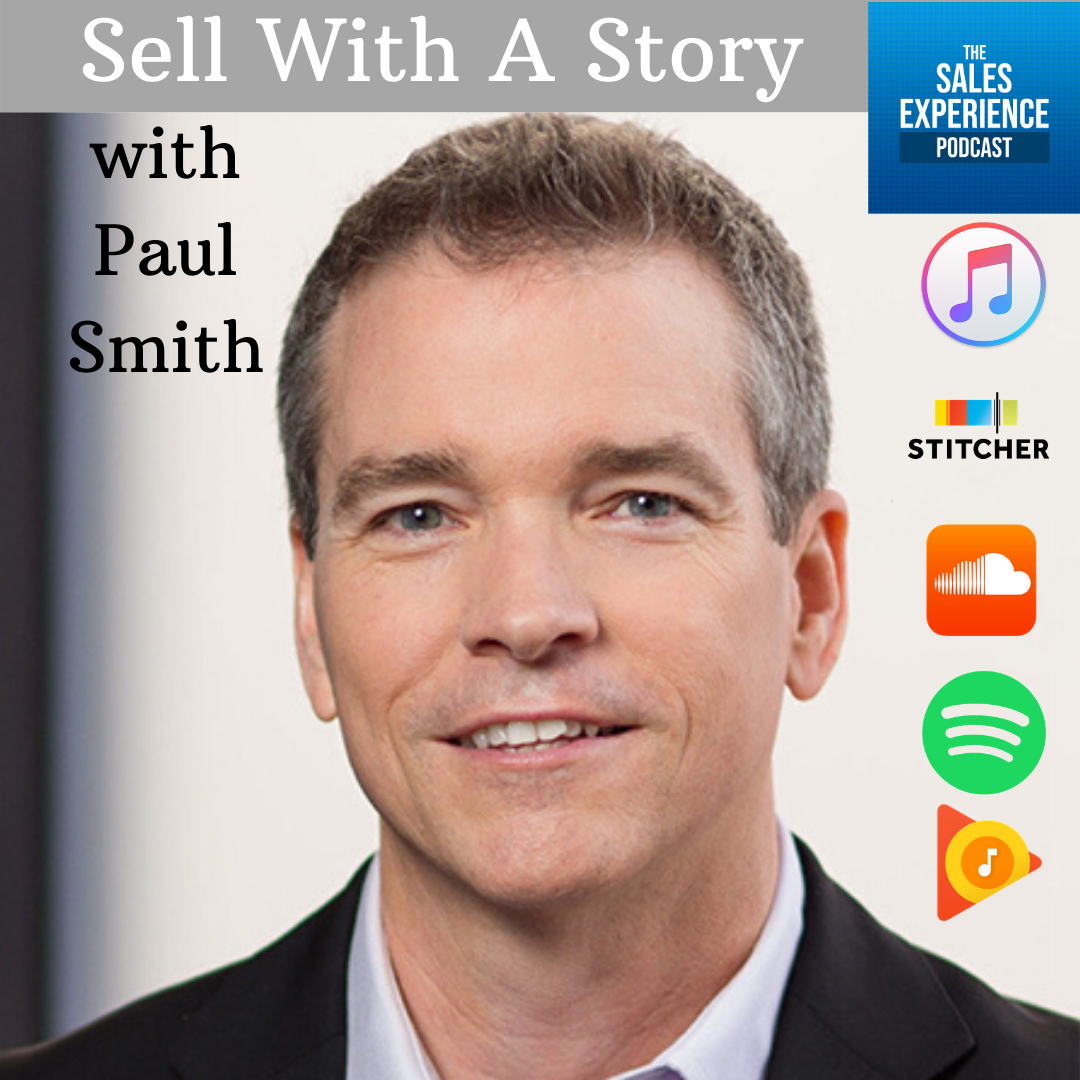Show Notes
This episode is very important for owners, sales leaders, AND sales reps to listen to.
It will help provide the framework for how you look at your decision making.
It will give you a strategy for dealing with change from above or handing out change down the line.
Make sure you are married to the right thing and keeping your options open by dating how you get there.
Download The Power of Authentic Persuasion ebook
Enroll in the Authentic Persuasion Online Course
Connect with Jason on LinkedIn
E146 – Transcript
Jason: Welcome to the sales experience podcast. My name again is Jason Cutter. So glad that you’re here. So thankful that you’re on this journey, on this ride where my mission if you’re new to the show, is to help the world to change its perception of the sales professional. I would love nothing more and I have focused everything I can on getting people to act as sales professionals so that we can shift the way sales are done and the way a salesperson is viewed right now, a lot of the world views a salesperson as this manipulative, slick, slimy salesperson. A lot of people instantly, whether you’ve dealt with them or not, just pass down through generations. People think of the used car salesperson, which is a terrible label and it’s one that I want to change. I want to change sales as a profession like a doctor, like an attorney, like anything else where it requires some professional level of accountability and service and just doing the right thing for people and being held to a standard.
Jason: So that’s what my focus is. So glad you’re here. Hopefully, that’s what you’re looking for as well. Whether you’re a sales rep, a manager and owner. Now for today’s episode, I want to talk about a very interesting concept that I hadn’t really touched on for many years. I haven’t really focused on it and it’s not something I’ve talked about in the podcast, but it came up when talking to a guest recently and recording something for the show. And I reminded myself of this and I wanted to talk about this topic. Now, if you’re an owner or a manager, this topic is very important for your salesperson. This one is really important for you to listen to as well. So I hope that you tune in and listen for the whole episode because it’s going to be so valuable. Help you with your mindset. Now, what is the phrase?
Jason: What is the important thing to focus on? It’s Marry the vision, date the strategy. Okay, so if you’re an owner or a sales manager, you want to marry the vision and date the strategy. Now let’s break that apart. Other than being a funny saying, let’s focus on what that means and what to do about it. So the first part, Mary, the vision. So every company, every person has a vision for what they want to create in their life, whether it’s stated or it’s written, whether it’s on the wall and it’s in a frame or it’s just in their mind. Everyone has a vision. Every owner of a company has a vision of what they want to create. Obviously the more solid that vision is, the more documented, the more that shared with everybody. So there is a shared vision and a shared mission and a focus on where you want to go the better.
Jason: Now when we’re talking about marrying the vision, what we want to do is marry that vision of what the company should be doing, what it’s focused on, and what it’s trying to do in the world are trying to solve, right? So there are companies that have services, products, ideas, all the whole range, right? So this isn’t just ones that are out there trying to save the world. This isn’t talking about a vision for a nonprofit that’s gonna, you know, cause world peace or you know, feed the starving children of the world. Those are great concepts and great things to focus on. However, I’m talking about for every business out there, whether you’re selling a SAS product to businesses or you have an app that you want people to download, whatever it is, you have a vision. You want to marry that vision. Now, what does marrying a vision mean?
Jason: Well, except for what it seems like in the past couple of generations when somebody got married, that was it. Till death do you part for life, for good and for bad. You have that marriage and then that’s it. Right now, obviously that has changed over the time frame and marriage has been something that started and then ended for a lot of people, but in terms of this which you want to do is you want to marry that vision. What is your vision? What do you have? Now, keep in mind, a lot of companies don’t have a vision. They have an idea. They have their product, they have their service, they’ve had what they’ve created, they have what they want to sell, they know where they want to get to or they have these goals or these numbers. They put something in a business plan. They might not have a vision.
Jason: Most companies don’t have a written vision and that’s something you always want to do. Now, if your starting out, if you’re been in business only a few years, you probably won’t have a vision, a mission and a core values, but it’s very important that you have those. Even if you have them, you write them down as an owner and you don’t share them with your team. At some point you want to document that and then you want to, as your company progresses, then you want to start creating that culture in your company and you want to marry that vision. Now, for the companies I am speaking to now, this is you have a sales team. You have a process. It could be two sales reps, you could have a hundred sales reps. It doesn’t matter, but you want to marry that vision, which means no matter what, everybody knows clearly where the company’s going, what the company is focused on, and what the destination is.
Jason: What is the vision? What do we want to create, right? So if we’re on a road trip, where do we want to get to? You’re starting in California, right? You’re in San Francisco, you want to get to New York city. That is the vision I want to get to New York city. Now the question is how am I going to get there? That’s where the strategy comes in. Remember the first part of the phrases, marry the vision. Second part is date the strategy. Now, breaking that down. What that means is the how, not the why, not the what, where we’re going, but the how we’re going to get there. That is going to be fluid. And this is where a lot of salespeople, if you’re listening to this, a lot of salespeople have a lot of problems because in their mind, as an employee, as somebody who’s operating with a primal part of our brain, which we all do, don’t like change in our mind as a salesperson, a lot of times I see people who marry the vision and marry the strategy, they get hired at a company, they know where the company’s going, and they see the strategy as what’s going on right now, let’s say right when they started at the company and they literally don’t want anything to change.
Jason: That strategy has to be the same. And if you look historically, there’s been some big companies who have lasted for quite some time, built to a certain level, but they become so big that they can’t adjust, they can’t adapt, they can’t change, and they die a terrible death because they can’t adapt. They’re too married to their vision and then married to their strategy and they aren’t able to change either one. So as an owner of a company, as a manager of a sales team, you want to marry the vision and you want to date the strategy. Meaning you’re dating the strategy, you’re trying it out, you’re seeing how it’s going cause it’s something we want to do long term. Is it short term? Are we just friends? Are we more than friends? So you want to make sure that you’re dating the strategy and you’re, I guess in an open relationship with strategy where if something else comes along but helps you get to your vision that that’s what you want to do as a salesperson.
Jason: Listening to this, always keep that in mind. You may not understand what’s going on at the business owner level. You may not understand what’s going on that the owner’s doing to make the decisions they do. A lot of frontline salespeople, even team leads and sales managers aren’t getting the whole picture from the owner because they just don’t understand all the different factors that are affecting it. Strategy changes, approach changes. Anything could be comp plan, it could be scripting, it could be technology, could be processed marketing. It could be so many different things. The strategy changes if the vision is still in line, everyone else needs to understand that the strategy is different from the vision, right? If you’re going from San Francisco to New York city, that’s your vision. What happens if your car breaks down, right? You get to Nevada car breaks down. Now what are you going to do?
Jason: Right? So now we got to find a different strategy. If you want it bad enough, you want to get to New York, are you going to take the bus again? Take the train, you’re going to buy a plane ticket. The strategy is going to change and it needs to be fluid because life is fluid and life is messy and things are always going to come at you and in business things need to change because no matter what, even if everything is stable and the market is stable, two things will always change is your competitors will change because some will go away, new ones will come in. They are going to affect the market that you’re in and what you have to do in order to get sales. And then the second part that will always change and always be different is your consumer is your prospect is your customer.
Jason: So no matter what you’re selling to businesses directly to the consumer, doesn’t matter. They’re always going to change and evolve. Especially right now, right? This is 2020 brand new decade. We’ve had the internet for like 25 years and it’s just still evolving. But if you think about how much consumers, prospects, again, this could be an individual consumer or it could be a business, how much information they have at their fingertips as a buyer before you even speak to them right before they walk into your store, walk onto your lot, call your company or answer the phone when you call them or respond to a letter you send them or a banner ad, whatever it is, the amount of information that everyone has at their fingertips levels the field so much and makes it so even between you, the salesperson, then them that you have to adapt. You have to change your strategy.
Jason: You have to do things different now than you did five years ago, 10 years ago. I’ve been doing this for a long time and the way that I deal with people now, people who are trying to buy is so much different than 15 years ago because the consumer is different. They have information. They don’t need information from you. They need wisdom. Wisdom is the application of knowledge. They have knowledge, they have tons of knowledge. Everyone has tons of knowledge. Pick up your phone, tell your phone, Hey, what is this, this, this, right? It will instantly find it for you on internet. That’s knowledge. Wisdom is what they need and so wisdom is the part where you come in, but that’s a different strategy now than 15 years ago where knowledge was enough and wisdom didn’t matter. So always make sure as a business owner, Mary, the vision date, the strategy as a sales rep, make sure when you’re a part of a company and change is happening, managers are telling you have to change a process, change script, compliance, marketing, whatever that changes.
Jason: Make sure to fight your animal instinct that’s going to kind of put up your walls and try to dig in and fear change cause you want to stay in your comfort zone. Instead, look at how that change is in the framework of the vision of the companies. The company still heading in the same direction. If that’s the case and this is a new strategy, embrace that strategy as something that the owner at some level has decided needs to happen for the sake of the company to achieve its mission. Remember when change comes out, it’s not just a make your life miserable. It’s not just a test you to see if you like change and if you can handle change, there’s a business reason for it. There’s a purpose for it. The owner has decided management has decided that that’s something needs to change, that the vision can be achieved so the company can keep going in the right direction and so make sure as a salesperson, you’re married to the vision of the company.
Jason: If that changes, that’s a much bigger conversation than this here, but make sure you’re married to the company’s vision and that you understand that everything is dating the strategy. In this day and age, you’re dating the strategy and that is going to be in your conversations. It’s going to be what the company gives you. It’s going to be in your own marketing. The way you deal with LinkedIn right now at the beginning of 2020 is different than LinkedIn. Five years ago, two years ago, in five years from now, LinkedIn will be different. So the strategy of what you’re doing in dealing with prospects, networking, marketing, whatever that is. As a sales professional, your strategy is going to change. But make sure you’re married to the vision because that will give you the peace of mind. Know that you’re going California to New York, you will get there. How you get there, you don’t know and you’ve got to be open to that. You’ve got to be okay with, you know, we’re going to go on this road. Things may happen, might be a detour, might be traffic, car, might have issues you don’t know, but you want to marry the vision and date the strategy. Now, hopefully, that helps everyone. Listening, owners, managers, salespeople. I appreciate you. Make sure Mary, your vision date, your strategy, and as always, keep in mind that everything in life is sales and people remember the experience you gave them.
![[E146] Marry the Vision, Date the Strategy](https://episodes.castos.com/salesexperiencepodcast/images/TSEP-E146-Cover-Image.png)


